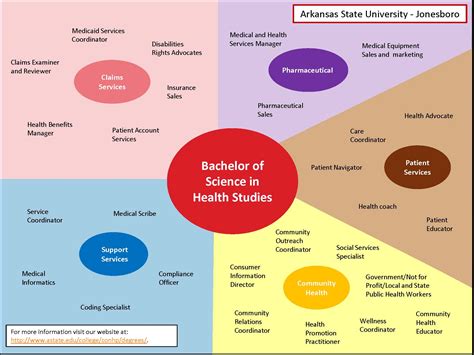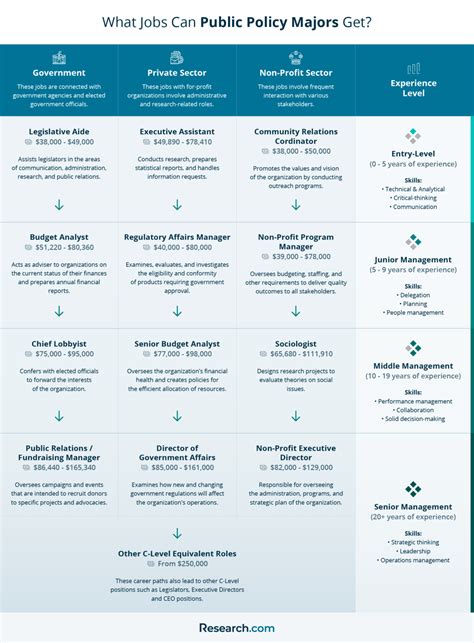Intro
Discover the vast array of careers in health studies, from healthcare management to public health policy. Unlock opportunities in health education, research, and advocacy. Explore the diverse fields of health informatics, epidemiology, and health promotion. Learn how to turn your passion for health into a rewarding career and make a lasting impact on communities.
Health studies is a field that offers a wide range of career opportunities for individuals who are passionate about health and wellness. Whether you're interested in working directly with patients, conducting research, or developing policies, a career in health studies can be both rewarding and challenging. In this article, we'll explore the various career paths available in health studies and provide insights into what it takes to succeed in this field.
The Importance of Health Studies

Health studies is an interdisciplinary field that draws on knowledge from social sciences, natural sciences, and humanities to understand the complex factors that influence health and illness. By studying health, individuals can gain a deeper understanding of the social, cultural, and environmental factors that shape health outcomes. This knowledge can be applied in a variety of settings, from clinical practice to policy development.
Career Paths in Health Studies
Clinical Careers
Clinical careers in health studies involve working directly with patients to prevent, diagnose, and treat illnesses. Some examples of clinical careers in health studies include:
-
Physician Assistant
Physician assistants work under the supervision of physicians to provide medical care to patients. They may conduct physical exams, diagnose illnesses, and develop treatment plans.
-
Nurse Practitioner
Nurse practitioners provide primary and specialty care to patients. They may work in hospitals, clinics, or private practices, and may specialize in areas such as pediatrics or gerontology.
-
Occupational Therapist
Occupational therapists help patients develop the skills they need to perform daily tasks and maintain their independence. They may work with patients who have physical or cognitive disabilities.

Research Careers
Research careers in health studies involve conducting studies and gathering data to better understand health and illness. Some examples of research careers in health studies include:
-
Epidemiologist
Epidemiologists study the causes and patterns of diseases in populations. They may work in government agencies, universities, or private industry.
-
Health Educator
Health educators teach people about healthy behaviors and disease prevention. They may work in schools, community organizations, or healthcare settings.
-
Biostatistician
Biostatisticians analyze data to understand health trends and outcomes. They may work in universities, government agencies, or private industry.

Policy Careers
Policy careers in health studies involve developing and implementing policies to promote health and wellness. Some examples of policy careers in health studies include:
-
Health Policy Analyst
Health policy analysts analyze data and develop policies to improve health outcomes. They may work in government agencies, think tanks, or private industry.
-
Public Health Administrator
Public health administrators oversee programs and services to promote health and wellness. They may work in government agencies, non-profits, or private industry.
-
Health Educator
Health educators teach people about healthy behaviors and disease prevention. They may work in schools, community organizations, or healthcare settings.

Skills and Qualifications
To succeed in a career in health studies, individuals need to possess a range of skills and qualifications. Some of the key skills and qualifications include:
-
Strong Communication Skills
Health professionals need to be able to communicate effectively with patients, colleagues, and other stakeholders.
-
Analytical Skills
Health professionals need to be able to analyze data and understand complex health issues.
-
Empathy and Compassion
Health professionals need to be able to work with patients who are experiencing illness or injury.
-
Cultural Competence
Health professionals need to be able to work with patients from diverse cultural backgrounds.

Education and Training
To pursue a career in health studies, individuals typically need to complete a degree program in a relevant field. Some examples of degree programs in health studies include:
-
Bachelor's Degree in Health Studies
A bachelor's degree in health studies provides a foundation in the social sciences, natural sciences, and humanities.
-
Master's Degree in Public Health
A master's degree in public health provides advanced training in health policy, epidemiology, and health education.
-
Doctoral Degree in Health Studies
A doctoral degree in health studies provides advanced training in research methods, health policy, and health education.

Conclusion
A career in health studies can be both rewarding and challenging. Whether you're interested in working directly with patients, conducting research, or developing policies, there are many career paths to choose from. By possessing the right skills and qualifications, completing a degree program in a relevant field, and gaining practical experience, individuals can succeed in a career in health studies.
Gallery of Health Studies Careers
Health Studies Careers Gallery









FAQs
What is health studies?
+Health studies is an interdisciplinary field that draws on knowledge from social sciences, natural sciences, and humanities to understand the complex factors that influence health and illness.
What are some career paths in health studies?
+Some examples of career paths in health studies include clinical careers, research careers, and policy careers. Clinical careers involve working directly with patients, while research careers involve conducting studies and gathering data. Policy careers involve developing and implementing policies to promote health and wellness.
What skills and qualifications do I need to succeed in a career in health studies?
+To succeed in a career in health studies, individuals need to possess a range of skills and qualifications, including strong communication skills, analytical skills, empathy and compassion, and cultural competence.
